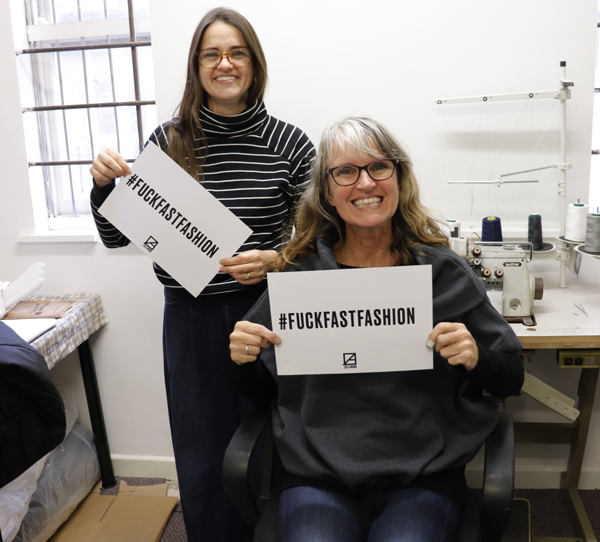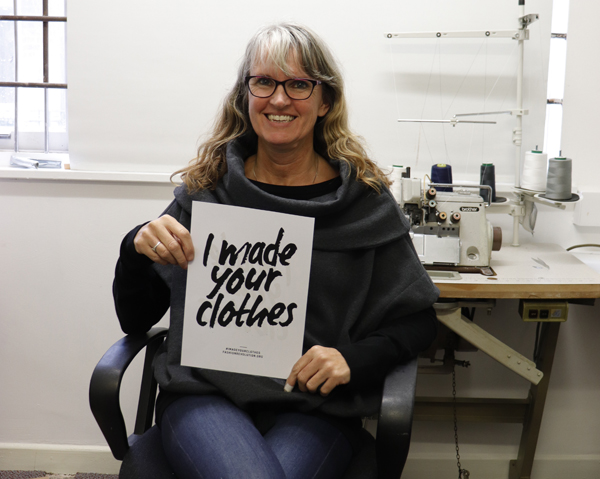Emily Evans, the founder of Brighton based fashion garments, Zola Amour is swearing for sustainability, and I have to admit, if nothing else, it sure did get my attention!
I'm not sure how I feel about a clothing brand swearing in a hashtag, which is so on trend with our younger generation, but maybe that is exactly what it needs to make us sit up and take notice.
Emily Evans states: "Fuck Fast Fashion is a sentiment I 100% stand behind. I'm sorry if this offends you, but fast fashion offends us. I’m fed up with fast fashion brands masquerading as sustainable and ethical - it’s all greenwashing. The BS has to stop - it’s time to give up fast fashion in the name of having a positive impact with your purchase by purchasing from ethical, sustainable makers like Zola Amour."
Emily decided to focus her attention on shaking up the industry and to reject the current business model of buy cheap, wear it a few times and chuck it away when it falls apart. Deciding to focus on making essential items out of good quality organic fabrics that are made to last.
I, along with everyone else, what to do my bit for saving the planet but also, I don't have deep pockets so to change from "Cheap Fashion" to more expensive handmade clothing will be a big ask for some. So Emily, help us out here:
How can we change people's mindsets from going to these 'fast fashion shops' to Zola Amour when the cost per items will be considerably more expensive?
"Firstly, if a product is 'cheap' then someone, somewhere has been short-changed, whether it's the farmer, the dyer or the worker... Someone hasn't been paid correctly for their work. Fashion markups can range from 2.5x - 5x cost. So, basically if a t-shirt is RRP £5- then the maximum cost that was paid to make that t-shirt was £2, that has to include paying the farmer, the spinner, the weaver, the dyer, the machinist and shipping - Surely an RRP of £5 is an impossibility if everyone has been paid?
"Finally, there's the long term cost of the garment. It's simple, if we spend a little bit more on a garment initially (ensuring that it has been made using earth-friendly fabrics and that every person involved in the supply chain of that garment has been paid correctly) then it is usually of a higher quality and will last much longer - we aim for a lifetimes worth of wears at Zola Amour - which in terms of cost, is much better 'value'."
As Zola mentions, not all costs are financial! There is also an environmental impact on our fast, cheap clothes we are buying!
What damage is the fast fashion doing to our environment and our planet to help redirect those who care that there is No Planet B to buy organic from Zola Amour?
"As I mentioned above, fast fashion is a highly polluting industry (one of the worst).
"Many fast fashion pieces are actually made out of polyester because it's cheap to produce, so you are basically wrapping yourself in plastic - it's made in exactly the same way and derived from oil (polyester accounts for 10% of all plastic produced each year). When it is made it emits extremely toxic emissions that contribute greatly to the climate emergency. During their use, they shed micro-plastic fibres, which pollute our air (traces are in all of our lungs), when washed they release 700000 tiny plastic fibres, which are impossible to clean from water and end up polluting our water systems, ending up in the ocean... In the ocean, they are eaten by marine life, which ends up being eaten by us. So it's loose - loose at every stage.
"Ultimately, it's the rate at which we consume that is damaging, it's essential that we buy less and buy better for a healthy planet, we cannot continue to consume in the rate that we do, or there will be no coming back from the climate emergency that we find ourselves in. "
If you want to see for yourself what Emily is talking about, we use guppyfriend washing bag in our wash and it is designed to collect the tiny plastic particles from the wash.
You can see why Emily and her mother Mimi are taking a stand with #FUCKFASTFASHION and maybe next time before we purchase that £2.50 T-Shirt that will only get worn twice before it falls apart, we think about that cost.
- Was it worth it? It may be cheap today but it will cost dearly in the long run to the earth.
- Will you be joining Zola Amour in sticking your fingers up to cheap, fast fashion or is it here to stay?
One person can make a difference.
The shops are all about Supply and Demand. If every "one person" stopped buying the cheap T-Shirts that would take away the demand. Take away the demand you take away the supply.
We can all do our bit - there is no Planet B.






No comments:
Post a Comment
Thank you for popping by - and even bigger thanks if you're showing me a bit of love by leaving a comment :D xoxo